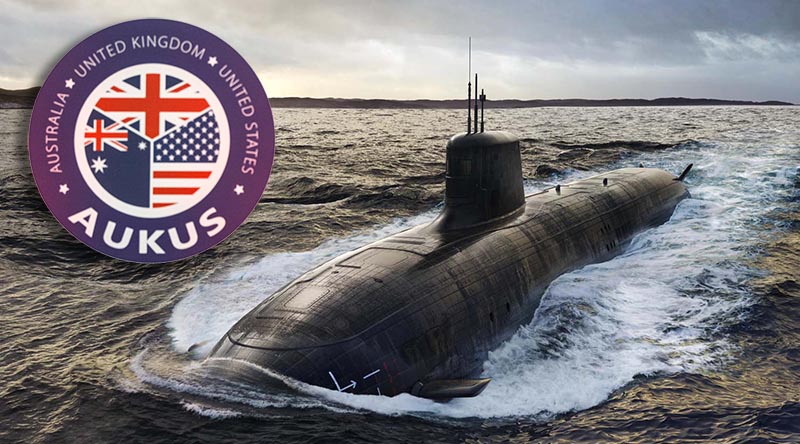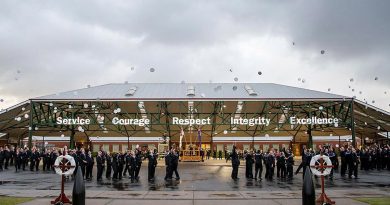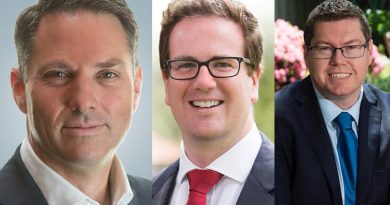AUKUS sub build and sustainment partners announced
Share the post "AUKUS sub build and sustainment partners announced"

Australia’s sovereign submarine build partner and sovereign-submarine sustainment partners were announced by the government yesterday..
FILE PHOTO: Artists concept of a possible SSN-AUKUS, Australia’s future nuclear-powered submarine, with AUKUS logo. Image supplied.
Minister for Defence Richard Marles said the announcement was a critical step towards the construction of Australia’s SSN‑AUKUS submarines at Osborne, South Australia, and sustainment of the nuclear‑powered submarines, including through Submarine Rotational Force-West, in Western Australia.
“These partnerships mark the start of further extensive opportunities for Australian industry and workers, underpinning the single biggest capability acquisition in our nation’s history,” Mr Marles said.
“Working with our AUKUS partners, Australia is not just acquiring world-leading submarine technology, but building a new production line, supply chain and sustainment capability for conventionally-armed, nuclear-powered submarines in Australia.”
Minister for Defence Industry Pat Conroy said the construction of conventionally-armed, nuclear-powered submarines would be the greatest industrial endeavour Australia had ever attempted, both in scale and technical complexity.
“We are now closer to realising this generational undertaking,” Mr Conroy said.
“This announcement is further evidence that the AUKUS agreement continues to be implemented at pace by all three partners, paving the way for the creation of more than 20,000 highly skilled jobs for decades to come.”
Sovereign Submarine Build Partner
Mr Marles said the government had selected ASC Pty Ltd and BAE Systems to build Australia’s SSN‑AUKUS submarines.
“These world-leading companies will work closely together to establish the foundations of the complex project and will initially form a collaborative arrangement, which will lead to the establishment of a long-term incorporated joint venture within Australia.
“This joint venture will establish an enduring partnership between ASC and BAE Systems to bring together and leverage the unique and complementary capabilities, skills, expertise and resources of the two partners to deliver Australia’s SSN-AUKUS submarines.
“ASC has been at the centre of Australia’s sovereign submarine program for decades as Australia’s prime sovereign submarine sustainment partner, and the builder of the Collins-class submarines.
“Its experience in submarine construction, testing, commissioning and certification, including physical integration of US combat systems, make ASC a reliable, tested and capable partner.
“BAE Systems is the United Kingdom’s long-term submarine build partner and brings more than 60 years of nuclear-powered submarine-building experience, world-class industrial capability and intellectual property to the partnership.
“BAE’s involvement ensures an integral connection between the SSN-AUKUS design led by BAE Systems in the UK, where Australian experts are already working alongside their peers, and the SSN-AUKUS build strategy in Australia.
“ASC and BAE – and once established, their joint venture – will operate collaboratively within a wider enterprise and be accountable and responsible for the delivery of our SSN‑AUKUS submarines, as well as ensuring safety, security, and regulatory compliance throughout the build program.
“The Commonwealth will hold sovereign protection rights in relation to the governance of the joint venture to preserve our national interest in the build program.
“By bringing ASC and BAE together, the government has determined the best structure for the build of our SSN-AUKUS submarines.
“Importantly, it enables Australia’s sovereign-submarine build partners to develop and expand an Australian industrial base and supply chain for long-term submarine construction in Osborne, South Australia.”
Sovereign Submarine Sustainment Partner
The government selected ASC Pty Ltd for the sustainment of nuclear-powered submarines in Australia, commencing with the Virginia-class, followed by the SSN-AUKUS.
Mr Marles said this decision recognised ASC’s long history and expertise in the sustainment of submarines in Australia, in addition to its established workforce and supply-chain network.
“Building on ASC’s current role and capability in sustaining Australia’s Collins-class submarines, ASC’s sustainment capability for nuclear-powered submarines will be uplifted in the lead up to Australia acquiring its first Virginia-class submarine from the United States in the early 2030s.
“It will include significant workforce growth and the development of skills, knowledge and experience required to sustain Virginia_class submarines.
“The passage of the National Defense Authorization Act (NDAA) in December 2023 through the United States Congress represented important progress toward enabling the next steps in realising Australia’s conventionally-armed, nuclear-powered submarine capability.
“With the passage of this Act, exemptions were established that will authorise Australian workers to sustain US submarines – an activity never before enabled under US legislation.
“With the NDAA passed, there will be opportunities to embed Australian workers from ASC in the Pearl Harbor Naval Shipyard to train on sustainment of US conventionally-armed, nuclear-powered submarines.
“ASC will also provide sustainment support to visiting US and UK submarines at HMAS Stirling, in the lead up to the establishment of Submarine Rotational Force-West from 2027.
“Importantly, ASC’s growing role in nuclear-powered submarine sustainment will be integrated with the existing Collins-class submarine enterprise and sustainment arrangements, providing the opportunity to strengthen our sovereign capability while Australian workers learn new skills for the future.
“This plan secures our current and future submarine capabilities.
“The task ahead is significant and will require ASC’s deep engagement with Australian industry.
“ASC and the Australian Submarine Agency will further refine upcoming opportunities for Australian industry to become involved in the sustainment program as planning matures.
“ASC will also develop robust industry partnerships with UK and US businesses to gain the technical skills, know-how and capacity to sustain nuclear-powered submarines.”
Delivering on AUKUS
Mr Marles said the work to deliver Australia’s conventionally-armed, nuclear-powered submarines was already well underway, and key land acquisition and infrastructure upgrades had already commenced, all to ensure Australia was able to begin construction of our first SSN‑AUKUS before the end of this decade.
“Additionally, work has already begun to develop the skills to maintain our nuclear-powered submarines with increased visits of US and UK SSNs ahead of the arrival of Australia’s own sovereign Virginia-class submarines.
“Australia’s commitment to meeting the highest safety, security and nuclear non-proliferation standards in supporting our acquisition of conventionally-armed, nuclear‑powered submarine capability will be a central element of the work undertaken by both our build and sustainment partners.
“Establishing the Australian Naval Nuclear Power Safety Regulator, with legislation currently before the Australian Parliament, will be another important step in building and ensuring an environment of nuclear safety and security.
“The new strategic partnerships announced today will deliver and sustain Australia’s nuclear-powered submarines, making Australia a more capable security partner and better able to respond to our changing strategic environment.
“AUKUS is the single biggest investment in the history of Australia’s defence capability, with record investment in defence, skills, jobs and infrastructure.”
Door-stop press conference at Osborne, South Australia (22 March 2024):
SOUTH AUSTRALIAN PREMIER, PETER MALINAUSKAS: Well good morning. It is fantastic to be here at Osborne on a really significant day for the state of South Australia and an important one for the nation at large. It is an absolute privilege to be here this morning with so many important guests and dignitaries. Let me start, of course, with Defence Secretary Grant Shapps. It’s a privilege to have him here today along with Deputy Prime Minister, Richard Marles and Caroline Kennedy. They’ll all be saying a few words in just a moment. But I’m also very grateful to be here with my good friend Penny Wong, of course the Foreign Minister our nation, along with David Cameron, the Foreign Secretary of the United Kingdom. To have such esteemed guests here today is very much a representation of the fact that Adelaide is at the heartbeat of our nation’s defence effort. Adelaide is the home of one of the most sophisticated sovereign shipbuilding exercises we have seen anywhere in the world, and it’s only set to grow here. The AUKUS relationship represented by Secretary Cameron and Shapps and Ambassador Kennedy and Penny and Richard is something that our nation really simply must do, and South Australia can make a defining contribution to our national security in that regard.
When we think about the opportunity before us, it’s hard not to get excited. But today we really start to see rubber hit the road with BAE being announced as a consortium partner with ASC to build the most complex machines ever built in human history right here in South Australia. And often when we talk about it we think about the jobs and the big numbers and so forth. But in actual fact, it’s not the volume of work that is going to be undertaken here as part of this exercise; it’s the importance of the work. The chance to dramatically improve the economic complexity not just of South Australia but our country as a whole. But in doing so, actually contribute to the security of our nation. Yesterday we had the labour force statistics released and we saw that South Australia now leads the nation as the best performing economy in our country. So this enterprise, this national endeavour, is not a case of what the commonwealth can do for South Australia but, rather, what South Australia can build for our nation. To that end, this partnership, the AUKUS partnership, the State and Federal Government partnership, is something we’re exceptionally excited about. I’d like to congratulate ASC and BAE on winning this project. Now we can hit the ground running, start employing people, building the skills academy that will literally transform the lives of thousands of South Australians. So we’re exceptionally excited about it. It’s a proud day for our state. It’s an important one for our country, and I’d just like to invite Defence Secretary Shapps to say a few words followed by Ambassador Kennedy along with the Deputy Prime Minister.
UK SECRETARY OF STATE FOR DEFENCE, GRANT SHAPPS: Well, good morning. It’s great to be here in Adelaide for such an auspicious moment in time because as everybody realises, we’re living in a more dangerous time. The world is perhaps going through a trickier period. I described it previously as going from a post-war to a pre-war era, but not because we want to be at war; in fact, we want exactly the opposite. And that is why AUKUS is so important. It gives us the opportunity to work globally with the United States, with Great Britain and with Australia to build these extraordinary machines that Peter was just telling us about – the AUKUS – the SSN-AUKUS sub. Not something that you would normally see done between three different friends, three different partners. A completely new approach to thinking about not just building a submarine but our global security as well.
So this announcement today is extremely important and it’s going to mean that, as you just heard, there are jobs provided both here but also at home in the United Kingdom as well as we come together, as we pool our best people, our best brains, our best ideas together to build these nuclear-powered submarines that will be so important in terms of particularly ensuring that there’s freedom of navigation in the Indo-Pacific and, of course, through our contributions in our SSNs in other parts of the world as well. And we know these are difficult times. We’ve seen what happens when waterways are challenged, when that freedom of navigation is limited, and we know that it’s important not to allow for that to go unchallenged. And, again, that is why no matter where you are – whether it’s in the Indo-Pacific, whether it’s in the South China Sea, the Red Sea or in the North Atlantic – it is absolutely vital that that freedom of navigation is continued now and forever into the future. And that is why this enormous commitment by all three countries working together in AUKUS is so critically important.
Now, there are other strands to AUKUS. There’s the pillar II, which will be about other technologies. The thing which I think is perhaps most evident and most obvious is the building of these new submarines. And we’re delighted to be doing that in close partnership with our friends here in Australia but also, of course, with our US partners. And I’m pleased now to introduce Ambassador Kennedy to speak.
UNITED STATES AMBASSADOR TO AUSTRALIA, CAROLINE KENNEDY: Thank you. It’s an honour to represent the United States here with the senior leaders of our two closest allies – the United Kingdom and Australia – and to be here with all the people in this shipyard who are going to be part of this incredible workforce of the future. It’s been an historic year. We were in San Diego just last March and now we’re here to announce the beginning of this new era for AUKUS, building submarines here in Australia.
So, there is so much to come, but this has been a really historic year in the contributions to peace and stability in the Indo-Pacific, and we start now and build. So it’s an honour to work- to be present here today.
DEPUTY PRIME MINISTER, RICHARD MARLES: Well, thank you. It is a very significant day to be announcing that ASC and BAE will form a joint venture to build Australia’s nuclear-powered submarines right here at the Osborne naval shipyard. And, in addition, ASC will do the sustainment of the nuclear-powered submarines under the Submarine Rotational Force West in Western Australia. These are big foundational decisions which demonstrate that the pathway to Australia acquiring a nuclear-powered submarine capability under the banner of AUKUS is happening. And the result of that right here is going to be the most advanced manufacturing in the nation and one of the most advanced manufacturing production lines in the world. When it’s up and running four to 5,000 people will be involved here at the Osborne naval shipyard in building Australia’s future nuclear-powered‑ submarines. And when you add that to the building of the Hunter class frigates here in Adelaide, this shipyard when it’s up and running will have 7,000 people building Australia’s navy. And I want to thank all of those who are present here today for the work that you’ve done. What is ahead is an exciting but an enduring future. People can look to what we are doing here knowing they can start their career and finish their career building Australia’s future navy.
Can I thank ASC, can I thank BAE for all the work you’ve done to getting us to this point. I would like to acknowledge Charles Woodburn who’s here today, the global head of BAE, but particularly I want to acknowledge our AUKUS partners – Grant and David who are here representing the United Kingdom, Ambassador Kennedy representing the United States. The AUKUS banner has been so important in terms of enabling Australia to make a giant leap in our military capability. That’s what our future nuclear-powered submarine capability will be. And in a difficult world, having that capability is fundamental to keeping Australians safe.
Questions.
JOURNALIST: How much will Australia take part in the design of the future SSN-AUKUS? And are you confident you can keep it within the stated budgets that are already nearing decline?
MARLES: Well, I don’t accept the last part of that question. I mean, we are confident about both the time frame and the budgets associated with delivering this. The design of SSN-AUKUS is going to be, well, really in many respects a trilateral design between all three countries. But we will be working closely with the UK. And it’s important to understand that the class of submarines that will be produced here will be jointly run by Australia and the United Kingdom. There will be a production line in Barrow in the UK, which will be producing the same class of submarine for the Royal Navy for the UK, and that’s really important because having two production lines amongst friends enables us to share risk, gain experience from each other not just in the building of the submarines but in the operation of them. And so this is very much a joint activity the whole way through, beginning with design.
JOURNALIST: How many SSN-AUKUS subs will be built here at Osborne?
MARLES: Well, this is going to be an enduring capability. I think that’s the important point to make. It’s not a specific number; this is forever. There is no country in the world which has obtained the capability to build nuclear-powered submarines who’s then turned that capability off. And that’s what people need to understand we are doing here at Osborne in having the first of the nuclear-powered submarines roll off the production line in the early 2040s. On a drum beat thereafter every few years we will see submarines being produced here on an enduring basis.
JOURNALIST: Minister, some quite prominent critics have said submarines will never – nuclear-powered submarines will never be built here. What’s the significance of today’s announcements in answering those critics?
MARLES: Well, I mean, there will always be critics and there have kind of been critics from day one. But I think what you can see from what we have done today but not just today – the steps we have taken in establishing the Australian Submarine Agency, the legislation that we put through our Parliament, the legislation that we’ve seen go through the United States Congress – the three governments involved here are working at a pace to make this happen. This is going to happen. And we need it to happen from an Australian point of view.
Our submarines and having long-range capable submarines are the single most important military platform that we can bring to bear. And that will not have the capability in the future as it even has today unless we move to having them being nuclear-powered. And so we are utterly committed to walking down that path. And the reason we have confidence about this despite all the commentary that you might hear is that there is a bipartisan position on this in Australia, but there is in the UK and there is in the United States as well. And that’s what we need to make sure that this is something which is delivered not just this year and next but this decade and next, because this is an enduring project which is going to transform Australia’s military capability. Thank you.
Official AUKUS trilateral statement – 22 March 2024
One year ago, on 13 March 2023 in San Diego, the Leaders of Australia, the United Kingdom, and the United States announced the Optimal Pathway. The Optimal Pathway outlines an ambitious plan to deliver a conventionally armed, nuclear-powered submarine capability (SSNs) for the Royal Australian Navy – a plan that will strengthen our three countries’ combined military capabilities, boost our collective industrial capacity, set the highest non-proliferation standard and enhance our ability to promote stability and security in the Indo-Pacific and beyond.
AUKUS is built on the bedrock of decades of close defence, capability and technology cooperation between our three nations and is a natural progression of our partnership. Today, AUKUS partners welcomed the announcement of the selection of ASC Pty Ltd and BAE Systems to build Australia’s SSN-AUKUS submarines, and the selection of ASC as Australia’s nuclear-powered submarine sustainment partner.
The formation of these strategic partnerships with industry is a significant milestone in the AUKUS endeavour. It is a demonstration of our trilateral industry supporting the Optimal Pathway becoming a reality and will underpin Australia’s role as a capable security partner and responsible steward of a conventionally armed, nuclear-powered submarine capability for decades to come.
The enduring trilateral partnership between the governments of Australia, the United Kingdom and the United States supports these commercial relationships and further enables the close industrial collaboration across our three countries in support of AUKUS.
ASC and BAE Systems will build the SSN-AUKUS submarines for the Royal Australian Navy. BAE Systems has been at the heart of the UK’s submarine enterprise for generations. SSN-AUKUS is being trilaterally developed, based on the United Kingdom’s next-generation design and incorporating technology from all three nations, including cutting edge United States submarine technologies. Also to be built by the UK and operated by the Royal Navy, SSN-AUKUS will be equipped for intelligence, surveillance, undersea warfare and strike missions, and will provide maximum interoperability among AUKUS partners.
ASC has been at the centre of Australia’s sovereign submarine program for decades as Australia’s sovereign submarine sustainment partner, and the builder of Australia’s Collins-class submarines. ASC will build its sustainment capability for SSNs, including through partnering opportunities with UK and US industry. Sustainment capability is critical to the Optimal Pathway, accelerating Australia’s ability to operate and sustain its own Virginia class submarines as soon as possible and contribute to regional security, together with AUKUS partners.
The Optimal Pathway was always designed to create a stronger, more resilient trilateral submarine industrial base, supporting submarine production and maintenance in all three countries. The announcements today are a testament to that – the build of SSN-AUKUS will increase opportunities for industrial base collaboration, strengthen our collective industrial base capacity, and generate economic growth in defence and national security sectors in all three countries. Similarly, the announcement of Australia’s sovereign sustainment partner is a key milestone to build Australia’s capacity to operate and sustain nuclear-powered submarines. ASC will, in time, develop robust industry partnerships with UK and US businesses to gain the technical skills, know-how and capacity to sustain nuclear-powered submarines.
All AUKUS partners are investing significantly to ensure success of the Optimal Pathway and are working at pace to transform and integrate our trilateral industrial bases to support SSN cooperation.
• Australia has agreed an AUD $1.5 billion investment for early priority works at HMAS Stirling, to put in place the enablers for the safe and secure rotational presence of United Kingdom and United States SSNs through Submarine Rotational Force-West from 2027. Australia has also commenced enabling works at the future nuclear-powered submarine construction yard at Osborne Naval Shipyard in Adelaide. All up, Australia has committed at least AUD $18 billion in infrastructure upgrades across South Australia and Western Australia over the next 10 years to enable critical milestones for the Optimal Pathway.
• The United States has announced the intended investment of USD $11.4 billion in its submarine industrial base across the five-year defense budget period starting in 2025 to increase the production rate of Virginia class submarines as quickly and effectively as possible, to meet its own fleet requirements and support US commitments under AUKUS.
• The United Kingdom also announced last year that it would inject GBP £3 billion into its Defence Nuclear Enterprise, including the construction of submarine industrial infrastructure that will help to deliver the SSN-AUKUS program. Subsequently, Rolls-Royce has announced that it will double the size of its Derby site to support the delivery of the UK and Australian programs, which will include building all of Australia’s nuclear reactors.
Australia, the United Kingdom, and the United States remain fully committed to this shared endeavour. These steps to grow Australia’s submarine construction and maintenance capability are critical to the AUKUS partnership, expanding trilateral industrial capacity and building the collective resilience of AUKUS partners to produce and sustain conventionally armed nuclear-powered submarines for decades to come.
.
.

.
.
Share the post "AUKUS sub build and sustainment partners announced"





